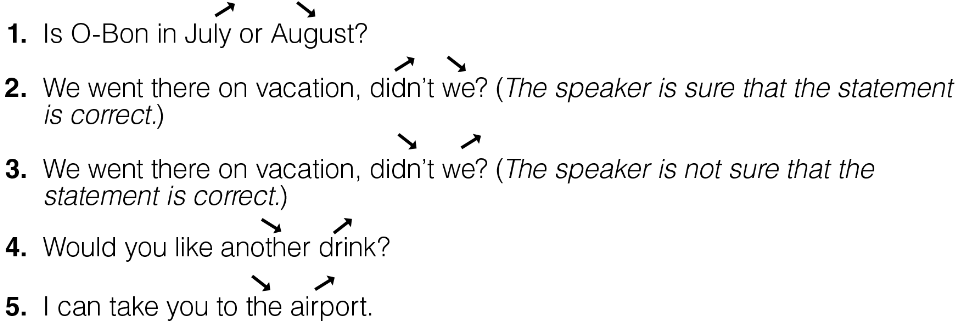Listen to the questions. Notice how the intonation rises and falls.

b. Listen to the sentence and notice how the intonation rises and falls.
(Nghe câu sau và chú ý ngữ điệu lên xuống như thế nào.)
She said she was feeling exhausted.
(Cô ấy nói rằng cô ấy đang cảm thấy kiệt sức.)
b. Listen to the sentences and notice how the intonation falls. (Nghe các câu và chú ý ngữ điệu lên xuống như thế nào.)
I was watching TV when the phone rang. (Tôi đang xem TV thì điện thoại reo.)
While we were driving to the beach, our car broke down. (Trong khi chúng tôi lái xe đến bãi biển, xe của chúng tôi bị hỏng.)
b. Listen to the sentence and notice how the intonation falls.
(Nghe câu và để ý ngữ điệu hạ xuống như thế nào.)
The umbrella tie is an umbrella that looks like a tie.
(Cà vạt ô là một chiếc ô trông giống như một chiếc cà vạt.)
b. Listen to the question and notice how the intonation rises.
(Nghe câu hỏi và chú ý ngữ điệu tăng như thế nào.)
Are you going to the fair tonight?
(Bạn có đi hội chợ tối nay không?)
b. Listen to the sentence and notice how the intonation falls. (Nghe câu và để ý ngữ điệu rơi xuống như thế nào.)
If we use electric hand dryers, we will save tissues. (Nếu chúng ta sử dụng máy sấy tay bằng điện, chúng ta sẽ tiết kiệm được khăn giấy.)
Rising and Falling Intonation (Phát âm: Ngữ điệu Tăng và Giảm)
When we ask questions with two options, we use rising and falling intonation. The intonation rises on the first option and falls on the second one.
(Khi chúng ta đặt câu hỏi mà có hai lựa chọn, chúng ta sử dụng ngữ điệu tăng và giảm. Ngữ điệu tăng ở lựa chọn đầu tiên và giảm ở lựa chọn thứ hai.)
Listen and mark the intonation in these questions, using  (rising intonation) or
(rising intonation) or  (falling intonation). Then practise saying them in pairs.
(falling intonation). Then practise saying them in pairs.
1. Do you want to go to university?
2. Have you talked with your parents about your plans?
3. How much does it cost to study at university?
4. What's your favourite subject at school?
Tham khảo:
1. Do you want to go to university?
2. Have you talked with your parents about your plans?
3. How much does it cost to study at university?
4. What's your favourite subject at school?
b. Listen to the sentences and notice how the intonation goes up.
(Nghe các câu và chú ý ngữ điệu đi lên như thế nào?)
Do you live in an apartment?
(Bạn có sống trong một căn hộ không?)
Does your house have a yard?
(Nhà của bạn có sân không?)
Listen and mark the intonation in these questions, using  (rising intonation) or
(rising intonation) or  (falling intonation). Then practise saying them in pairs.
(falling intonation). Then practise saying them in pairs.
1. Are you interested in studying at university?
2. How much is the fee for this cooking course?
3. Did you attend the education fair?
4. Who would like to train to become a tour guide?
Mark the intonation in these questions, using  (rising intonation) or
(rising intonation) or  (falling intonation). Listen and check. Then practise saying them.
(falling intonation). Listen and check. Then practise saying them.
1. Should we report bullying to teachers or speak to our parents first?
2. Is this social awareness campaign about poverty or crime?
3. Have you ever experienced any physical, verbal, or social bullying?
4. Do you worry about peer pressure, body shaming, or bullying?
1. Should we report bullying to teachers 
(Chúng ta nên báo cáo hành vi bắt nạt với giáo viên hay nói chuyện với cha mẹ trước?)
2. Is this social awareness campaign about poverty 
(Đây có phải là chiến dịch nâng cao nhận thức xã hội về nghèo đói hay tội phạm không?)
3. Have you ever experienced any physical 

(Bạn đã bao giờ bị bắt nạt về thể chất, lời nói hoặc xã hội chưa?)
4. Do you worry about peer pressure 

(Bạn có lo lắng về áp lực của bạn bè, sự xấu hổ về cơ thể hoặc bắt nạt không?)